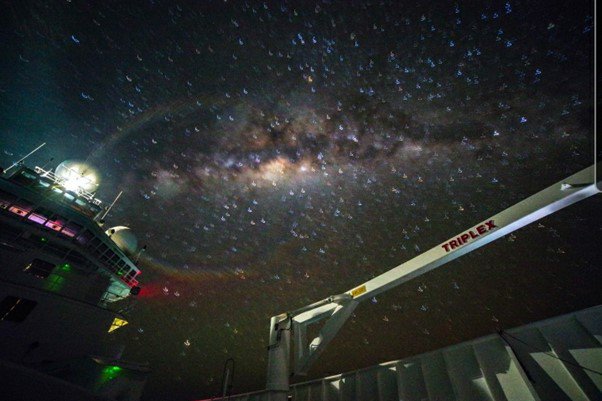Voyage to the deep sea – Destination Unknown
Five AMRI scientists voyage into the deep sea on board the CSIRO research vessel Investigator. Between laboratory preparations and star gazing, excitement builds en route to their destination – a destination that is largely unknown. Alice Yan tells us more about the voyage journey.
It takes six days and five nights of sailing, at 11 knots or 20 kilometres per hour, to reach our study sites in the Indian Ocean Territories. That is the pace of a fast sprinter, a leisurely bike rider or the maximum travelling speed of a Komodo dragon.
After the initial exhilaration of setting sail from Darwin port, we now ease into the long lull of transit. The days are filled with animated conversation about black corals, scanning the horizon for blue whales, and preparing a comprehensive fish encyclopedia. As for the nights, they are filled with unsullied starlight.

From the deck of CSIRO research vessel Investigator.
Image: Robert French© Museums Victoria
There are 22 scientists onboard the RV Investigator, including experts in jellyfish, barnacles, and volcanology. Museums Victoria are leading the voyage and we are supported by 20 crew members (ranging from chefs to engineers), and 12 CSIRO staff (ranging from geophysicists to hydrochemists). As we sail closer toward our destination, the anticipation onboard mounts, for we voyage into the unknown.
Previous research has only surveyed the geology and oceanography of the waters around Christmas and Coco (Keeling) Islands but little is known of their rich marine life. Directed by Australia Museum Research Institute’s Professor Shane Ahyong, Principal Research Scientist, and Dr Elena Kupriyanova, Senior Research Scientist, I will be eagerly searching for the elusive and extremely rare lobsters of the Glypheidae family over the next 45 days. These tiny crustaceans were once abundant in the Jurassic era. However, until very recently, they have only been found in fossil form and were presumed extinct. I am taking part in this truly international collaboration with the Australian Museum as part of my two-year research Master program at Columbia University. I cannot imagine a more excited explorer than myself. As an environmental lawyer and Fulbright scholar, I seek to practise ground-breaking science alongside the country’s leading scientists, with the view of translating novel research into better future policy.
For now, we wait en route, with a steady eye on the horizon. Sunbathers on deck have spotted myriads of flying fish – a flurry of fluttering white fins across the sea surface, shooting away from the ship’s bow as it carves through the water.

Flying fish
Image: Robert French© Museums Victoria
The nights are no less dazzling. At sea, the blackness of the night sky is unadulterated; I have found myself on the open deck utterly transfixed, following the milky way as it stretches from horizon to horizon.

Star gazing
Image: Nish Nizar© Museums Victoria
Fortunately, few of us have been afflicted by sea sickness. For those who have fallen victim, it is a noxious venom. A venom that methodically infects your vision, your taste, your hearing – poisoning all your senses and finally your lust for life.
Still, for the sake of scientific exploration, it constitutes a small sacrifice. For the waters ahead – they are abound with marine life yet unnamed and undiscovered.
Alice Yan, Master of Ecology Evolution & Conservation Biology and Fulbright scholar, Australian Museum Research Institute and Columbia University.
Acknowledgements
This research is supported by a grant of sea time on RV Investigator from the CSIRO Marine National Facility. We would like to acknowledge:
- The Marine National Facility
- Dr Tim O-Hara (Museum Victoria), Chief Scientist “Investigating the IOT”
- Crew and scientists on board the RV Investigator
- CSIRO
- Photos: Robert French (Museum Victoria)
Please note, the CSIRO research vessel Investigator voyage has been temporarily suspended and the planned voyage will be rescheduled.

